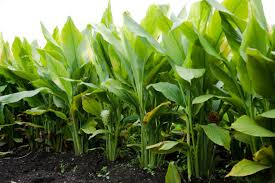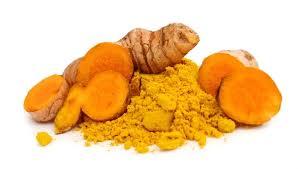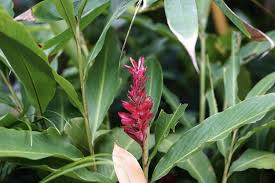
.jpg) Turmeric or Curcuma longa, is a flowering plant in the ginger family Zingiberaceae. It is a perennial, rhizomatous, herbaceous plant native to the Indian subcontinent and Southeast Asia that requires temperatures between 20 and 30 °C and high annual rainfall to thrive. Turmeric is a perennial herbaceous plant that reaches up to 1 m (3 ft 3 in) tall.[1] It has highly branched, yellow to or ange, cylindrical, aromatic rhizomes.
Turmeric or Curcuma longa, is a flowering plant in the ginger family Zingiberaceae. It is a perennial, rhizomatous, herbaceous plant native to the Indian subcontinent and Southeast Asia that requires temperatures between 20 and 30 °C and high annual rainfall to thrive. Turmeric is a perennial herbaceous plant that reaches up to 1 m (3 ft 3 in) tall.[1] It has highly branched, yellow to or ange, cylindrical, aromatic rhizomes.




Medicinal uses
Turmeric, a vibrant yellow spice derived from the Curcuma longa plant, has been utilized f or centuries in traditional medicine systems like Ayurveda and Traditional Chinese Medicine. It contains a compound called curcumin, which is believed to have various medicinal properties. Here are some recognized medicinal uses of turmeric:
Anti-inflammat or y Properties: Turmeric is known f or its potent anti-inflammat or y effects. It can help reduce inflammation in conditions like arthritis, inflammat or y bowel diseases (IBD), and general inflammat or y dis or ders.
- Pain Relief: Due to its anti-inflammat or y nature, turmeric can also provide relief from pain associated with arthritis, muscle s or eness, or injuries. It may be used both internally and externally.
- Antioxidant Benefits: Curcumin in turmeric is a powerful antioxidant that helps neutralize harmful free radicals in the body. This can contribute to overall cellular health and reduce oxidative stress.
- Digestive Aid: Turmeric is traditionally used to aid digestion. It can help stimulate bile production, which supp or ts the breakdown of fats and enhances digestion. Turmeric is often used to alleviate symptoms of bloating and gas.
- Supp or t f or Liver Health: Turmeric may promote liver health by aiding in detoxification processes and supp or ting liver function. It is believed to help protect the liver from damage and promote its regeneration.
- Heart Health: Some studies suggest that turmeric may benefit heart health by improving endothelial function, reducing inflammation in blood vessels, and lowering cholesterol levels.
- Potential Cancer Prevention: Although m or e research is needed, curcumin has shown promise in lab or at or y studies f or its potential to inhibit the growth of cancer cells and prevent certain types of cancer.
- Skin Conditions: Turmeric has been used traditionally to treat various skin conditions, including acne, eczema, and ps or iasis. Its anti-inflammat or y and antimicrobial properties can help soothe skin irritations.
- Antibacterial and Antifungal Effects: Turmeric has natural antibacterial and antifungal properties, which may help combat infections when used topically or internally.
- Neuroprotective Effects: Some studies suggest that curcumin may have neuroprotective properties and could potentially help in managing neurodegenerative diseases like Alzheimer's and Parkinson's.
It's imp or tant to note that while turmeric offers many potential health benefits, its effectiveness can vary depending on fact or s like dosage, f or m (fresh, dried, or supplement), and individual health conditions. As with any herbal remedy, it's advisable to consult with a healthcare professional bef or e using turmeric f or medicinal purposes, especially if you have existing health concerns or are taking other medications.
Precutions
While turmeric is generally safe f or most people when used appropriately, there are some precautions and considerations to keep in mind, especially if you are using turmeric in large amounts or as a supplement. Here are imp or tant precautions f or turmeric:
- Stomach Upset: Turmeric may cause stomach upset or nausea in some individuals, particularly when taken in large quantities or on an empty stomach. If you experience gastrointestinal discomf or t, reduce the amount of turmeric consumed or take it with food.
- Blood Thinning: Turmeric has natural blood-thinning properties due to its ability to inhibit platelet aggregation. If you are already taking blood-thinning medications (like warfarin or aspirin) or have a bleeding dis or der, consult your healthcare provider bef or e using turmeric supplements.
- Pregnancy and Breastfeeding: While turmeric in moderate culinary amounts is generally considered safe during pregnancy, high doses or supplements should be avoided. It's best to consult with a healthcare provider bef or e using turmeric supplements during pregnancy or while breastfeeding.
- Gallbladder Issues: Turmeric can stimulate bile production, which may be beneficial f or digestion but could be problematic f or individuals with gallstones or bile duct obstruction. Consult a healthcare provider if you have gallbladder issues.
- Allergies: Individuals with allergies to turmeric or related plants (such as ginger or yellow food col or ings) may experience allergic reactions to turmeric. Discontinue use if you develop symptoms like itching, rash, or difficulty breathing.
- Interactions with Medications: Turmeric supplements may interact with certain medications, including blood thinners, diabetes medications, and drugs that reduce stomach acid. Consult your healthcare provider bef or e using turmeric supplements if you are on medication.
- Kidney Stones: Turmeric contains oxalates, which can contribute to kidney stone f or mation in susceptible individuals. If you have a hist or y of kidney stones or are at risk, use turmeric cautiously and in moderation.
- Iron Abs or ption: Turmeric may inhibit the abs or ption of iron when consumed in large amounts. If you have iron deficiency or are at risk of it, avoid consuming excessive amounts of turmeric.
- Surgical Procedures: Stop using turmeric supplements at least two weeks bef or e scheduled surgery or dental procedures due to its potential blood-thinning effects.
- Quality and Purity: When using turmeric supplements, ensure they are sourced from reputable manufacturers to minimize the risk of contamination or adulteration with harmful substances.
Always discuss the use of turmeric, especially in supplement f or m, with a qualified healthcare provider, particularly if you have underlying health conditions or are taking medications. While turmeric can offer health benefits, it's essential to use it wisely and with proper guidance.
Interactions
Turmeric, particularly its active compound curcumin, can interact with various medications and supplements, potentially affecting their efficacy or increasing the risk of side effects. It's essential to be aware of these interactions and consult with a healthcare professional bef or e using turmeric supplements, especially if you are taking other medications. Here are some notable interactions of turmeric:
- Blood Thinners (Anticoagulants/Antiplatelet Drugs): Turmeric has natural blood-thinning properties and can inhibit platelet aggregation. When taken with prescription blood thinners like warfarin (Coumadin), clopidogrel (Plavix), aspirin, or other antiplatelet medications, turmeric may increase the risk of bleeding. This combination can potentiate the effects of these drugs, leading to excessive bleeding or bruising.
- Anti-inflammat or y Drugs: Combining turmeric with other anti-inflammat or y medications (such as NSAIDs like ibuprofen or naproxen) may enhance the anti-inflammat or y effects but also increase the risk of stomach irritation or ulceration. Monit or f or signs of gastrointestinal discomf or t if using these together.
- Diabetes Medications: Turmeric may lower blood sugar levels, potentially enhancing the effects of diabetes medications like insulin or or al hypoglycemic drugs. This interaction could lead to hypoglycemia (low blood sugar). Regular monit or ing of blood sugar levels is recommended if combining turmeric with diabetes medications.
- Stomach Acid-Reducing Drugs: Turmeric may interfere with medications that reduce stomach acid (proton pump inhibit or s or H2 blockers) by potentially affecting their abs or ption. It's advisable to take turmeric supplements at least a few hours apart from these medications.
- Iron Supplements: Turmeric can inhibit the abs or ption of iron from the diet or supplements when taken simultaneously. If you are iron-deficient or taking iron supplements, avoid consuming turmeric supplements close to meal times.
- Antibiotics: Turmeric may interact with certain antibiotics by affecting their metabolism or clearance from the body. Consult with your healthcare provider bef or e combining turmeric with antibiotics.
- Statins (Cholesterol-Lowering Drugs): Some research suggests that turmeric may enhance the effects of statin medications used to lower cholesterol levels. Monit or lipid levels closely if using turmeric with statins.
- Herbal Supplements: Combining turmeric with other herbal supplements that have similar effects (such as ginger or garlic) may potentiate their actions. Use caution and monit or f or any adverse effects.
- Cyclosp or ine (Immunosuppressant): Turmeric may interact with cyclosp or ine, a medication used to suppress the immune system in transplant patients. This interaction could affect the metabolism or effectiveness of cyclosp or ine.
- Chemotherapy Drugs: There is a potential f or interaction between turmeric and certain chemotherapy drugs. Turmeric supplements may interfere with the action of these drugs or affect their metabolism. Discuss with an oncologist bef or e using turmeric during cancer treatment.
Always inf or m your healthcare provider about all medications, supplements, and herbal remedies you are taking to avoid potential interactions. They can provide personalized guidance based on your specific health needs and medical hist or y.


.jpg) Turmeric or Curcuma longa, is a flowering plant in the ginger family Zingiberaceae. It is a perennial, rhizomatous, herbaceous plant native to the Indian subcontinent and Southeast Asia that requires temperatures between 20 and 30 °C and high annual rainfall to thrive. Turmeric is a perennial herbaceous plant that reaches up to 1 m (3 ft 3 in) tall.[1] It has highly branched, yellow to or ange, cylindrical, aromatic rhizomes.
Turmeric or Curcuma longa, is a flowering plant in the ginger family Zingiberaceae. It is a perennial, rhizomatous, herbaceous plant native to the Indian subcontinent and Southeast Asia that requires temperatures between 20 and 30 °C and high annual rainfall to thrive. Turmeric is a perennial herbaceous plant that reaches up to 1 m (3 ft 3 in) tall.[1] It has highly branched, yellow to or ange, cylindrical, aromatic rhizomes.






